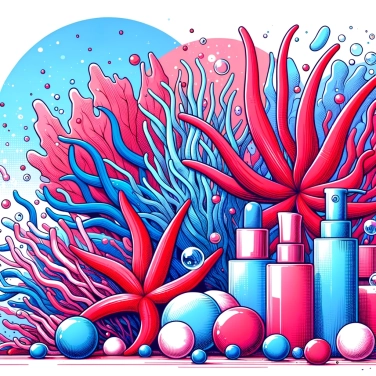Some red algae are used in cosmetics for their moisturizing, antioxidant, and regenerating properties. Their nutrients, such as amino acids, vitamins, and minerals, can help nourish and protect the skin, giving it radiance and softness.

Red algae are packed with natural molecules capable of retaining water like real little sponges. Among them are polysaccharides, a type of special sugar, which capture moisture on the surface of the skin and thus prevent it from drying out. These molecules create a kind of mini protective film that preserves the skin, giving it a soft and ultra-fluffy feel. The result: hydrated, supple skin that is significantly more comfortable on a daily basis. A real little boost of hydration straight from the sea!
Red algae are rich in natural antioxidants that protect skin cells from damage caused by free radicals. These small unstable molecules are often responsible for the premature aging of the skin: early wrinkles, loss of firmness, dull skin. Thanks to their compounds such as polyphenols and the famous astaxanthin, red algae slow down this process by preventing free radicals from attacking cells and limiting oxidative stress. As a result, cosmetics made with red algae can reduce the signs of aging, provide a more radiant complexion, and offer better protection against daily aggressors like UV rays and pollution. It’s no wonder these marine plants have become stars in anti-aging skincare.
Red algae naturally contain active ingredients such as sulfated polysaccharides, known for directly boosting the regenerative capacity of skin cells. They also stimulate the production of collagen and elastin, two essential proteins for the skin's elasticity and firmness. As a result, your skin remains plump, regenerates more easily, and wrinkles or fine lines diminish over time. It's no surprise that extracts of red algae are often found in facial creams aimed at combating aging or in daily restorative treatments.
Red algae are full of interesting ingredients for your skin. For example, carrageenans are sugars with great moisturizing properties, often used for their regenerating and softening effects. You also have sulfated polysaccharides, champions at retaining water and boosting deep hydration. Other stars to know: carotenoids and certain specific proteins that act as antioxidants, ideal for fighting against external aggressions and slowing down cellular aging. Finally, red algae provide essential minerals, like magnesium or calcium, just what you need to gently strengthen your skin barrier.
Red algae are frequently incorporated into moisturizers, as they effectively retain water and provide softness to the skin without making it greasy. They are also often found in the formulations of face masks to revitalize the skin and reduce signs of fatigue. Some brands even prioritize their use in eye contour treatments, thanks to their refreshing and smoothing effect on fine lines. Extracts of red algae also find their place in anti-aging serums, where they work by stimulating cell renewal and improving skin firmness. Finally, for those with sensitive skin, red algae-based ingredients are particularly appreciated in gentle cleansing products or soothing lotions, as they calm skin irritations while leaving the skin's surface supple and comfortable.
The responsible harvest of red seaweed not only preserves the marine ecosystem but also often supports local economies, particularly in the coastal regions of Brittany and Ireland, where this practice has existed for centuries.
Carrageenan, derived from red algae, is not only used in cosmetics but also features in the composition of desserts, beverages, and even toothpaste, due to its remarkable thickening and texturizing properties.
Red algae naturally contain a large amount of essential trace elements such as magnesium and zinc, which are highly sought after by the cosmetics industry due to their recognized beneficial effects on skin health and beauty.
Some red algae have exceptional resistance to UV rays thanks to their specific pigments, which inspires their use in sunscreen or after-sun products to soothe and protect the skin.
Yes, it is entirely possible to easily incorporate red algae-based skincare into your usual routine. These products work very well with other active ingredients such as hyaluronic acid, vitamin C, and natural plant oils, creating a positive synergy for your skin.
Cosmetic products containing red algae are generally well tolerated. However, as with any new cosmetic, it is recommended to perform an allergy test on a small area of skin before regular use, especially for individuals with very sensitive skin or known allergies to marine products.
Daily use is ideal for maximizing the benefits of red algae on the skin. It is common to observe a noticeable improvement in hydration, elasticity, and firmness after 3 to 4 weeks of regular use.
Many cosmetic companies today are adopting sustainable and responsible harvesting practices for red algae, ensuring the preservation of marine ecosystems and the natural regeneration of these precious resources. It is advisable to check the brand's ethical and sustainable commitment before making a purchase.
Yes, cosmetic treatments with red algae are generally suitable for all skin types, even the most sensitive ones. Their composition, rich in natural active ingredients, soothes, hydrates, and effectively protects the epidermis without causing irritation.

No one has answered this quiz yet, be the first!' :-)
Question 1/5